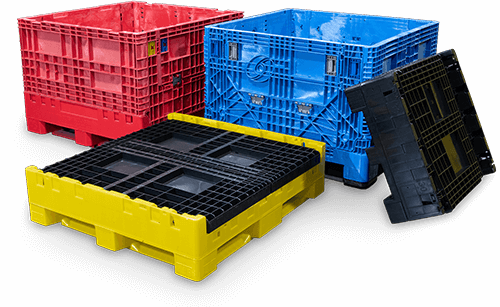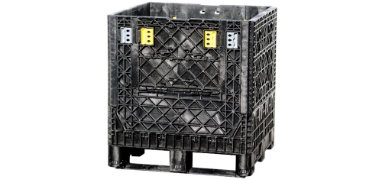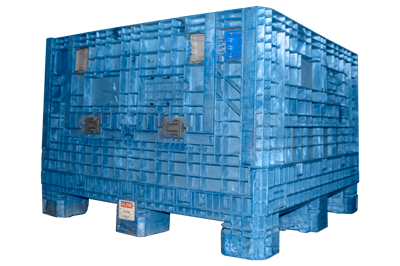Learn why refurbished bulk containers are trusted by logistics and storage experts
Wiki Article
Innovative Solutions: Discovering the Flexibility of Bulk Containers in Different Industries
Bulk containers have actually become a crucial innovation throughout multiple sectors. Their style enhances storage and transport performance, dealing with diverse needs while advertising sustainability. Organizations in farming, production, and logistics report considerable enhancements in operational procedures. Nonetheless, the true degree of their impact may not yet be fully understood. Checking out the different applications and benefits of mass containers could disclose insights that improve industry requirements. What exists ahead for this developing remedy?Enhancing Agricultural Effectiveness With Mass Containers
How can mass containers transform farming methods? In the domain of farming, bulk containers function as a critical advancement, improving efficiency and sustainability. They enable farmers to save and carry big amounts of grains, plant foods, and seeds, lessening the requirement for numerous smaller plans that commonly contribute to throw away. By making use of mass containers, farming operations can maximize their supply chains, reducing dealing with prices and time. These containers are created for very easy loading and dumping, enabling for swift changes in between various phases of farming processes.Furthermore, bulk containers advertise better supply monitoring, making sure that producers have sufficient materials on hand without unwanted. This performance converts to minimized labor costs and enhanced performance. In a field frequently tested by changing demand and seasonal variants, the integrity and scalability offered by mass containers present a considerable advantage, equipping farmers to concentrate on high quality and yield.
Simplifying Manufacturing Processes Via Bulk Solutions
Bulk services play an essential duty in enhancing production processes by facilitating reliable material handling and offering cost-effective storage options. These containers aid preserve a well organized manufacturing atmosphere, inevitably enhancing workflow and efficiency. As industries progressively adopt bulk solutions, they are most likely to experience considerable renovations in operational effectiveness.Efficient Material Handling

Efficient material handling is vital for maximizing manufacturing processes, as it straight affects efficiency and cost-effectiveness. Using bulk containers can considerably simplify procedures by streamlining the activity and storage of products. Their layout enables for simple loading and dumping, minimizing the time workers spend dealing with specific items. This efficiency not just decreases labor prices however additionally enhances process, allowing producers to react quickly to require changes. Furthermore, bulk containers promote better organization within facilities, facilitating fast accessibility to materials and decreasing downtime. By implementing these functional remedies, manufacturers can boost overall functional performance, making certain that assembly line run efficiently and successfully while lessening waste and resource expenditure. Mass containers play a crucial function in boosting product handling practices.
Cost-efficient Storage Space Solutions
As producers seek to maximize their operations, affordable storage solutions end up being significantly essential. Mass containers give a useful methods of keeping huge quantities of products, lowering the need for multiple smaller sized storage space devices. This combination brings about decrease inventory prices, as mass containers frequently need less handling and lead to reduced labor expenditures. Furthermore, their standardized sizes promote effective stacking and storage space, taking full advantage of stockroom space. By utilizing mass containers, producers can lessen waste and enhance the total organization of their facilities. These containers are also created for longevity, which can lower replacement expenses with time. On the whole, integrating mass containers into storage strategies permits producers to streamline procedures while keeping profitability and effectiveness in their supply chains.
Boosted Production Workflow
Using mass containers considerably improves manufacturing workflows by simplifying the monitoring of products throughout the manufacturing process. These containers help with efficient storage and transportation, reducing the moment invested on dealing with products. Consequently, producers can achieve quicker turn-around times and reduce delays in production. Mass containers likewise promote better organization, allowing teams to conveniently access raw materials when required, which further improves procedures. Additionally, the standardized size and shape of these containers enable maximized usage of stockroom room, adding to total efficiency. By integrating mass solutions right into their operations, companies can improve supply control and reduce waste, inevitably leading to boosted efficiency and a more active manufacturing setting.Reinventing Food Service Logistics
The food solution market is undertaking significant change through the adoption of bulk containers, improving storage space capacities and enhancing room use. Effective storage space solutions make it possible for organizations to handle stock better, while structured transportation processes decrease costs and improve distribution times. Because of this, these advancements are reshaping logistics and driving better effectiveness across the market.
Reliable Storage Solutions
Cutting-edge storage services are transforming food service logistics by boosting performance and maximizing area utilization. Bulk containers, designed for optimum ability, permit food provider to reduce squandered area while keeping easy accessibility to items. These containers can be stacked and arranged according to stock demands, improving the storage procedure. Furthermore, their longevity assurances that foodstuff continue to be secure and risk-free, minimizing perishing and losses. With features such as modular styles and compatibility with various shelving systems, these containers can adapt to varied kitchen formats. By employing effective storage solutions, food solution procedures not just improve workflow however also boost total efficiency, guaranteeing that resources are utilized efficiently to fulfill client needs.Structured Transport Processes
While many elements add to the efficiency of food service logistics, structured transportation procedures play an essential function in optimizing supply chain procedures. The fostering of bulk containers greatly boosts the motion of goods, enabling for quicker loading and unloading at distribution. Their standardized sizes assist in reliable piling and storage, reducing lost space during transportation. In addition, bulk containers lower the demand for read more too much product packaging, bring about lower costs and reduced environmental impact. By ensuring that items are securely delivered, they alleviate damage and spoilage, which is crucial in the disposable food market. Generally, the assimilation of bulk containers right into transport approaches not just enhances operational effectiveness yet also supports lasting techniques within the food solution sector.The Role of Bulk Containers in Drug Supply Chains
In the pharmaceutical sector, mass containers play a vital duty in guaranteeing the risk-free and effective transportation of raw materials and completed items. These containers are especially designed to fulfill stringent governing requirements, offering optimal protection versus contamination and destruction throughout transportation. Their durable construction enables the secure transportation of delicate materials, such as energetic pharmaceutical ingredients (APIs) and complex solutions, while minimizing the risk of damage.Mass containers facilitate streamlined handling and storage space operations within stockrooms and manufacturing centers. Their standard dimensions enable compatibility with automated systems, boosting performance and lowering labor expenses. By utilizing mass containers, pharmaceutical companies can attain considerable price financial savings through mass purchasing and minimized packaging waste.
Promoting Sustainability in Packaging Practices
The pharmaceutical market's increasing reliance on bulk containers has actually triggered a wider exam of sustainability in packaging practices across numerous fields. As firms look for to decrease their environmental effect, cutting-edge techniques to product packaging have gotten traction. Bulk containers, made for reuse and recycling, offer a practical solution. Their longevity expands item lifecycles, lessening the need for single-use product packaging.The shift in the direction of environment-friendly finishings and eco-friendly materials has become integral in the style of these containers. This adjustment not only addresses waste reduction but additionally aligns with customer need for lasting items.
Industries such as food and cosmetics are embracing comparable approaches, acknowledging that sustainable product packaging can boost brand name reputation. Collaborative initiatives in between vendors and makers further promote sustainability, urging the advancement of closed-loop systems - used collapsible bulk containers. Ultimately, welcoming lasting product packaging techniques is important for cultivating a circular economic climate and reducing the environmental impact throughout varied sectors
Affordable Transport Solutions With Mass Containers

Furthermore, bulk containers streamline handling procedures, leading to lowered labor prices and minimizing the danger of damage during transit. Industries such as farming, chemicals, and pharmaceuticals benefit from the sturdiness and effectiveness of these containers, which can stand up to extreme problems while ensuring the stability of their components
Additionally, the multiple-use nature of bulk containers adds to long-term savings, as firms can depend on less, a lot more resilient devices instead than regularly replacing single-use packaging. By doing this, bulk containers not only boost performance but likewise sustain overall price management in supply chain procedures.
Modification and Versatility in Mass Container Style
While numerous bulk containers are developed for standard applications, their personalization and flexibility have ended up being important functions for industries with one-of-a-kind demands. Manufacturers now use a series of choices, enabling customers to tailor containers to specific measurements, products, and functionalities. This flexibility allows businesses to maximize storage space and transport procedures, making sure compatibility with numerous dealing with systems.For example, the food and pharmaceutical markets frequently need containers that meet rigid health and safety and security criteria. Personalized styles might include attributes such as tamper-proof seals, easy-to-clean surface areas, and specialized ventilation systems. In the farming field, bulk containers can be tailored to assist in the transport of diverse assets, from grains to fluids, improving functional effectiveness.
Eventually, the capability to personalize bulk containers not only improves performance but likewise sustains sustainability efforts by decreasing waste and making best use of source use throughout several markets. This versatility settings bulk containers as functional remedies in today's dynamic market.
Frequently Asked Inquiries
What Products Are Bulk Containers Usually Made From?
Bulk containers are usually made from products such as high-density polyethylene (HDPE), steel, aluminum, or polypropylene. These products supply sturdiness, resistance to chemicals, and the ability to safely store and transfer various items across sectors.Exactly How Are Bulk Containers Cleaned In Between Uses?
Bulk containers are typically cleaned up utilizing high-pressure washing, heavy steam cleansing, or chemical sanitization methods (used collapsible containers). The cleaning process assurances that deposits are gotten rid of, stopping contamination and maintaining the quality of materials for subsequent usages
Can Mass Containers Be Reused Numerous Times?
Yes, bulk containers can be recycled numerous times. Their robust design enables for repeated usage across different applications, provided they are correctly cleansed and kept after each use to guarantee safety and security and hygiene requirements.What Are the Weight Boundaries for Bulk Containers?
Weight restrictions for mass containers normally vary from 1,000 to 3,000 pounds, depending on the product and layout. Specs might differ by maker, so it is critical to get in touch with standards for certain container kinds.Are There Conventional Dimensions for Mass Containers?
Yes, there are standard sizes for bulk containers, typically ranging from 20 to 40 cubic feet. These measurements promote efficient storage and transportation across different markets, ensuring compatibility with equipment and enhancing area use.Making use of mass containers can markedly simplify operations by simplifying the activity and storage space of materials. In addition, mass containers promote much better organization within centers, assisting in fast accessibility to products and decreasing downtime. Bulk containers supply a functional methods of keeping big quantities of materials, decreasing the requirement for several smaller sized storage space systems. The food service industry is undertaking substantial makeover through the fostering of bulk containers, enhancing storage space abilities and optimizing space utilization. Mass containers assist in structured handling and storage procedures within stockrooms and production facilities.
Report this wiki page